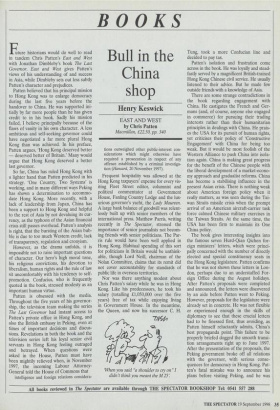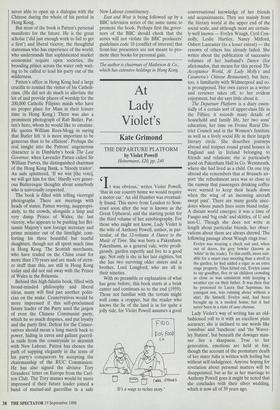BOOKS
Bull in the China shop
Henry Keswick
EAST AND WEST by Chris Patten Macmillan, f22.50, pp. 340 Future historians would do well to read in tandem Chris Patten's East and West with Jonathan Dimbleby's book The Last Governor. East and West gives Patten's views of his understanding of and success in Asia, while Dimbleby sets out less subtly Patten's character and prejudices.
Patten believed that his principal mission to Hong Kong was to enlarge democracy during the last five years before the handover to China. He was supported ini- tially by far more people than he has given credit to in his book. Sadly his mission failed, I believe principally because of the flaws of vanity in his own character. A less ambitious and self-seeking governor could have negotiated a far more plural Hong Kong than was achieved. In his preface, Patten argues, 'Hong Kong deserved better — deserved better of Britain.' Many would argue that Hong Kong deserved a better last governor.
So far, China has ruled Hong Kong with a lighter hand than Patten predicted in his strategy. 'One Country, Two Systems' is working, and in many different ways Peking has shown a determination to accommo- date Hong Kong. More recently, with a lack of leadership from Japan, China has been a support to Hong Kong and helpful to the rest of Asia by not devaluing its cur- rency, as the typhoon of the Asian financial crisis still passes overhead. Patten's analysis is right, that the bursting of the Asian bub- ble is due to too much Western credit, lack of transparency, regulation and cronyism. However, as the drama unfolds, it is impossible not to raise important questions of character. Our hero's high moral tone, his religious convictions, his devotion to liberalism, human rights and the rule of law sit uncomfortably with his tendency to self- promotion. Confucius, who is frequently quoted in the book, stressed modesty as an important human virtue. Patten is obsessed with the media. Throughout the five years of his governor- ship, the television team making the series The Last Governor had instant access to Patten's private office in Hong Kong, and also the British embassy in Peking, even at times of important decisions and discus- sions. Revelations in both the book and the television series left his loyal senior civil servants in Hong Kong feeling outraged and betrayed. When questions were asked in the House, Patten must have been mightily relieved when, in November 1997, the incoming Labour Attorney- General told the House of Commons that
intelligence and foreign relations considera- tions outweighed other public-interest con- siderations which might otherwise have required a prosecution in respect of any offence established by a criminal investiga- tion (Hansard, 20 November 1997).
Frequent hospitality was allowed at the Hong Kong taxpayers' expense for every vis- iting Fleet Street editor, columnist and political commentator at Government House, Fanling Country Lodge and the lux- urious governor's yacht, the Lady Maureen. A large bank balance of goodwill was relent- lessly built up with senior members of the international press. Matthew Parris, writing recently in The Spectator, stressed the importance of senior journalists not becom- ing friends with senior politicians. The Par- ris rule would have been well applied in Hong Kong. Habitual spending of this sort for politicians in Britain would be unthink- able, though Lord Neill, chairman of the Nolan Committee, claims that its remit did not cover accountability for standards of public life in overseas territories.
Nor was there anything modest about Chris Patten's salary while he was in Hong Kong. Like his predecessors, he took his salary (totalling £1,050,000 over the five years) free of tax while enjoying living in Government House. In the meantime, the Queen, and now his successor C. H.
`When you said "a shoulder to cry on" I didn't think you meant the M25'. Tung, took a more Confucian line and decided to pay tax.
Patten's isolation and frustration come across in the book. He was loyally and stead- fastly served by a magnificent British-trained Hong Kong Chinese civil service. He usually listened to their advice. But he made few outside friends with a knowledge of Asia.
There are some strange contradictions in the book regarding engagement with China. He castigates the French and Ger- mans (and, of course, anyone else engaged in commerce) for pursuing their trading interests rather than their humanitarian principles in dealings with China. He prais- es the USA for its pursuit of human rights, yet criticises their policy of 'Constructive Engagement' with China for being too weak. But it would be most foolish of the Western Alliance to push China into isola- tion again. China is making great progress for the benefit of the Chinese people with the liberal development of a market-econo- my approach and gradualist reforms. China has become a stabilising influence in the present Asian crisis. There is nothing weak about American foreign policy when it really matters, as was seen during the Tai- wan Straits missile crisis when the prompt arrival of an American aircraft-carrier task force calmed Chinese military exercises in the Taiwan Straits. At the same time, the USA has been firm to maintain its One China policy.
The book gives interesting insights into the famous seven Hurd-Qian Qichen for- eign ministers' letters, which were princi- pally concerned with the number of directly elected and special constituency seats in the Hong Kong legislature. Patten confirms that he was not shown these letters in Lon- don, perhaps due to an understaffed For- eign Office during the August holidays. After Patten's proposals were completed and announced, the letters were discovered by an aide before Patten went to Peking. However, proposals for the legislature were already set in concrete. He was not flexible or experienced enough in the skills of diplomacy to see that these crucial letters had to be finessed first, thus avoiding, as Patten himself reluctantly admits, China's best propaganda point. This failure to be properly briefed dogged the smooth transi- tion arrangements right up to June 1997. After the presentation of the proposals, the Peking government broke off all relations with the governor, with serious conse- quences for democracy in Hong Kong. Pat- ten's fatal mistake was to announce his plans before visiting Peking, and he was never able to open up a dialogue with the Chinese during the whole of his period in Hong Kong.
But most of the book is Patten's personal manifesto for the future. He is the great scholar (`did just enough work to fail to get a first') and liberal viceroy, the thoughtful statesman who has experience of the world, who understands that sophisticated market economies require open societies, the brooding prince across the water only wait- ing to be called to lead his party out of the wilderness.
Patten's office in Hohg Kong had a large crucifix to remind the visitor of his Catholi- cism. (He did not do much to alleviate the lot of and provide places of worship for the 200,000 Catholic Filipino maids who have no proper place for Mass in their leisure time in Hong Kong.) There was also a prominent photograph of Rab Butler, Pat- ten's hero, whom he would like to emulate. He quotes William Rees-Mogg in saying that Butler felt 'it is more important to be generous than to be efficient'. Perhaps the real insight into the Pattens' ungenerous character is in Dimbleby's book The Last Governor, when Lavender Patten called Sir William Purves, the distinguished chairman of the Hong Kong Bank, a 'bloody traitor'. An aide spluttered, 'If we win [the vote], we will get him for this.' Hardly very gener- ous Butleresque thoughts about somebody who is universally respected.
The book is filled with telling viceregal photographs. There are meetings with heads of states; Patten waving, inappropri- ately, to the crowds, alongside a limp and very damp Prince of Wales; the last viceroy, who appears to be pushing her Bri- tannic Majesty's new foreign secretary and prime minister out of the limelight; com- forting his three beautiful but tearful daughters, though not all spent much time in Hong Kong. The Scottish merchants, who have traded on the China coast for more than 170 years and are made of stern- er stuff than this, are still in Hong Kong today and did not sail away with the Prince of Wales in the Britannia.
Behind this high-falutin book, filled with broad-minded philosophy and liberal ideas, many will find just another politi- cian on the make. Conservatives would be more impressed if this self-proclaimed future leader of the Party used the jargon of even the Chinese Communist party, which he so much despises, and put loyalty and the party first. Defeat for the Conser- vatives should mean a long march back to power, hiding in caves and gallant guerril- la raids from the countryside to skirmish with New Labour. Patten has chosen the path of supping elegantly in the tents of his party's conquerors by accepting the chairmanship of the RUC Commission. He has also signed the divisive Tory Grandees' letter on Europe from the Carl- ton Club. The Tory masses would be more impressed if their future leader joined a band of mutual-aid guerrillas in a safe New Labour constituency.
East and West is being followed up by a BBC television series of the same name to promote the book. Perhaps first the_gover- nors of the BBC should check that the series will not violate the BBC producers' guidelines code 10 (conflict of interest) that front-line presenters are not meant to pro- mote their books for personal gain.
The author is chairman of Matheson & Co., which has extensive holdings in Hong Kong.











































































 Previous page
Previous page